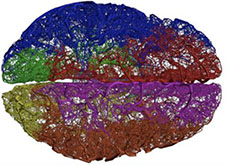While brain function originates in neuron, its energy is supported by the vascular system. With the recent development of anatomically detailed synthetic network models of the entire cerebral circulation, it is now possible to perform detailed simulations of physiology in realistic brains of small animals and humans on the computer. Modeling microcirculatory blood flow as a biphasic suspension of red-blood-cell and plasma, blood pressure, flow and hematocrit can be simulated in whole brains on the computer. Combining Poiseuille’s hemodynamic simulations with advection/diffusion equations describing oxygen diffusion, the human brain metabolism can now be modeled in-silico, by integrating tissue oxygen consumption and differential equations describing compartments associated with neural and glial brain cells. In parallel, energy metabolism regulation in the brain and its modeling has greatly progressed over the past few decades.
This workshop will thus be focused on digital human brains, and their use to predict critical metabolic functions namely blood flow, oxygen extraction and cellular metabolism across all length scales down to the level of individual capillaries and cells. Courses and conferences will be combined with research presentations and practical workshops.
Organizer: Frédéric Lesage, Polytechnique
Location: Center de Recherche Mathématique, Université de Montréal
Dates: October 12-20
Submissions for workshop presentations (oral, 30 minutes, students, post-docs, researchers): frederic.lesage@polymtl.ca
Confirmed guests:
- Andreas Linninger (U. Illinois at Chicago)
- Sylvie Lortois (CNRS, Université Toulouse III)
- Lucas Mueller (University of Trento)
- Jeffrey Illif (Washington University)
- Michèle Desjardins* (U. Laval)
- Jean Provost (Polytechnique)
- Joel Lefebvre (UQAM)
- Louis Gagnon (U. Laval)

